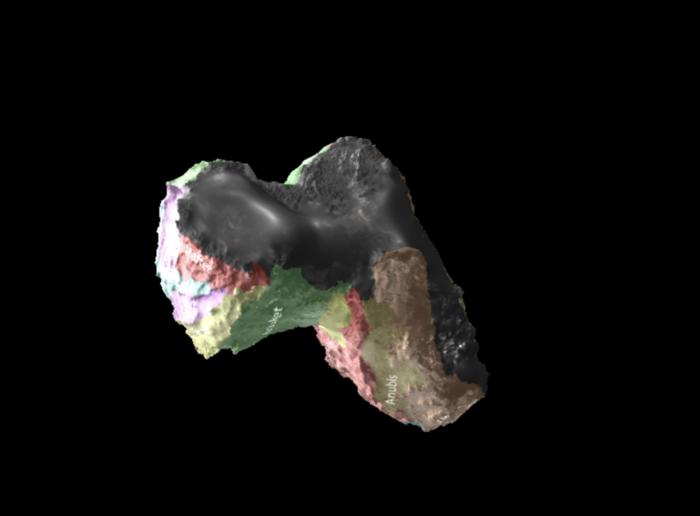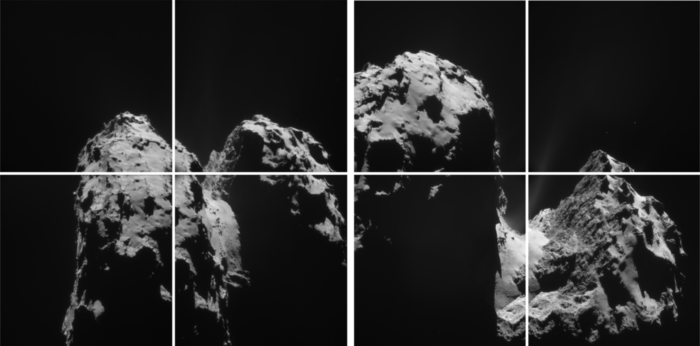[ a comet enters ]
[ entra un cometa ]
Plasma.
Hielo y piedra.
A small body composed of ice and rock.
Gas.
This is comet 67P, the singing comet. De familia joviana. De Júpiter.
A jostling electromagnetic wave covers the surface de los otros cuerpos presentes.
Alguien respira cerca del núcleo. Breathe outside the nucleus.
[ el comienzo de la obra ]
[ the play starts ]
El sonido cae como la imagen: eco roto.
What’s in a sound that comes from afar?
[ barely perceptible ]
A hand holds a word,
co-me-ta
c-o-m-e-t-a
It holds it as it holds air, gasping to say aloud “cometa que canta.”
This is a code to bring back the fragments, weaving the same electromagnetic field by opening the mouth de esquina a esquina.
La superficie de la lengua se vuelve gaseosa. The tongue extends into the emptiness of the stage.
No props.
In the center, not the nucleus. The nucleus is in a corner, there, ahí …en la esquina flameante.
La boca, the mouth fills the space.
Los dientes son superficies reflejantes; generan calor; rompen materia.
La saliva se arremolina para preguntar por los sonidos que vienen de lejos.
Rosetta en los surcos de la lengua.
[ On stage, the question of tone ]
Cómo se dice cometa. Cómo se dice cometa. Cometa se dice cómo.
Jolted out of the sun, the cold body shrieks.
Jolted out of the mouth, el sonido se quiebra.
The song quivers y permanece en el espacio.
El cruce húmedo, desbocado de la lengua produce una piedra.
Spit the stone.
Escupe la piedra ardiente and sing.
Split the flaming rock.
*images from the European Space Agency (https://rosetta.esa/int)
tras bambalinas : backstage
three characters over factual audio excerpt (stage hand, prop maker, flyman)
—floodlights on—
I don’t get it.
What?
No props: that’s stage direction, means either I won’t be working much, or they’ll use ancient props.
No, it’s part of the play: Learn to read.
No seas mamón.
Stop it!
Well, the rig job’s crazy! Gotta develop a whole civilization to get a camera there. Getting everything in place for last call takes millions of years.
See, those are my props. There are props.
Shit, it’s as nerve-wracking as it is exhilarating. The political will and the crew to get money lobbied, to set lights there.
Whitey is on the moon. Gaza’s on the news. The comet is screaming. Did you like the soundtrack?
Comes with a soundtrack?
Yep, and some nice reviews: This comet is singing it’s heart out! according to YouTube.
Who captured the electromagnetic oscillations?
That’s also a prop.
It’s a translation: from electromagnetic oscillation to almost musical —alien— clicks. Alien tempos, no refrains.
What do you mean the comet is screaming?
Didn’t you look at it?
Nope.
The head shot! Which head shot?
Third quadrant, left to right! See?

The cometa grita.
If you had run the oscillations through death metal AIs you could hear a scream, and not these reassuring clicks. If it’s a song, it’s a screaming song.
Are AIs props?
Kind of. Now run it through Spanish.
Ok, cometa is kite in Spanish is papalote, from náhuatl papalotl, which is butterfly.
A comet a kite a mariposa.
Now backwards through Greek.
OK: Cometa comes from como, Greek for cabellera, a sparkling body of hair, a tail, a cola de luz.
Cometa es cabellera.
I don’t see any hair: looks bald to me.
Creamy meringue stubble.That’s the other mug shot, another translation.
I’ll charge overtime, surely.
Cometa is a thing that flies and flows and flutters and twinkles.
Wait, maybe it’s not screaming. Maybe it’s yawning. How long has it been over there? Since the Big Bang? That’s a long time. Maybe it’s bored.
Please don’t start with that character development shit, you always do that!
Ok, what if it’s hungry? What if it travels throughout the cosmos looking for things to eat? It’s a starving maw that wants to swallow the cosmos!
You’re getting delusional again! Here’s your pills: take one.
That’s the question, how does a comet eat? How to swallow kites. Sorry, wrong filter. Cómo come cometa.
Keep it down, don’t shout.
I see four faces: maybe it’s a chorus? One of them looks scared.
Don’t mind them, they’re secondary characters.
Yep! But what’s the motivation?
Don’t go into that rabbit hole, please. It’s clear as rain: read the script, it spits. You get to know at the end. It spits its pit sit spit it spitsitspi tsitsipitsitstipsitspitsitspitsitspitsitspitsits.
Now look what you’ve done! Can you smack him, please?
It’s your fault. I haven’t done anything!
It’s always the same. You just can’t reason with some people.
You know what, it’s late, let’s call it a day. Did you take your pill?
Ok, that’ll help you get some sleep. Good job guys, nice to talk shop.
—as characters go out, we hear the original soundtrack: while offstage, a character is still going t spits its pit sit spit it spitsitspi tsitsipitsitstipsitspitsitspitsitspitsitspitsitself —


